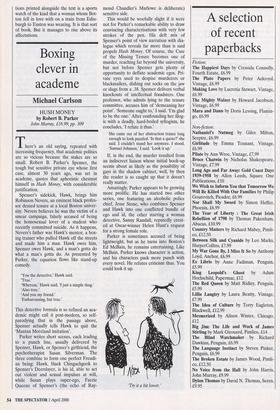Boxing clever in academe
Michael Carlson
HUSH MONEY by Robert B. Parker John Murray, £16.99, pp. 309 There's an old saying, repeated with increasing frequency, that academic politics are so vicious because the stakes are so small. Robert B. Parker's Spenser, the tough but sensitive private eye whose first case, almost 30 years ago, was set in academe, quotes that aphoristic chestnut himself in Hush Money, with considerable justification.
Spenser's sidekick, Hawk, brings him Robinson Nevers, an eminent black profes- sor denied tenure at a local Boston univer- sity. Nevers believes he was the victim of a smear campaign, falsely accused of being the homosexual lover of a student who recently committed suicide. As it happens, Nevers's father was Hawk's mentor, a box- ing trainer who pulled Hawk off the streets and made him a man. Hawk owes him, Spenser owes Hawk, and a man's gotta do what a man's gotta do. As presented by Parker, the equation flows like stand-up comedy.
`You the detective,' Hawk said.
`True.'
`Whereas,' Hawk said, 'I just a simple thug.'
`Also true.'
`And you my friend.'
`Embarrassing, but true.'
This detective formula is so refined an aca- demic might call it post-modern, so self- parodying that in the passage above, Spenser actually tells Hawk to quit the `Mantan Moreland imitation'.
Parker writes short scenes, each leading to a punch line, usually delivered by Spenser, Hawk, or Spenser's girlfriend, the psychotherapist Susan Silverman. The three combine to form one perfect Freudi- an being: Hawk, black Chingachgook to Spenser's Deerslayer, is his id, able to act out violent and sexual impulses at will, while Susan plays super-ego, Faerie Queene of Spenser's (the echo of Ray- mond Chandler's Marlowe is deliberate) sensitive side.
This would be woefully slight if it were not for Parker's remarkable ability to draw convincing characterisations with very few strokes of the pen. His deft mix of Spenser's point of view narration with dia- logue which reveals far more than is said propels Hush Money. Of course, the Case of the Missing Tenure becomes one of murder, reaching far beyond the university, but not before Spenser gets plenty of opportunity to deflate academic egos. Pri- vate eyes used to despise murderers or blackmailers, dishing out socks on the jaw or slugs from a .38. Spenser delivers verbal knockouts of intellectual fraudsters. One professor, who admits lying to the tenure committee, accuses him of 'demeaning her point'. 'Someone ought to,' I said. 'I'm glad to be the one.' After confounding her illog- ic with a deadly, hard-boiled syllogism, he concludes, 'I refute it thus.'
She came out of her abstraction trance long enough to look puzzled. 'Is that a quote?' she said. I couldn't stand her anymore. I stood. `Samuel Johnson,' I said. 'Look it up.'
If, in the end, the murder resulted from an indiscreet liaison whose initial hook-up seems about as likely as the possibility of gays in the shadow cabinet, well, by then the reader is so caught up that it doesn't really matter.
Amazingly, Parker appears to be growing more prolific. He has started two other series, one featuring an alcoholic police chief, Jesse Stone, who combines Spenser and Hawk into one conflicted bundle of ego and id, the other starring a woman detective, Sunny Randall, reputedly creat- ed at Oscar-winner Helen Hunt's request for a strong female role.
Parker is sometimes accused of being lightweight, but as he turns into Boston's Ed McBain, he remains entertaining. Like McBain, Parker knows character is action, and his characters pack more punch with every novel. He refutes criticism thus. You could look it up.
`Try it a bit lower.'






















































































 Previous page
Previous page